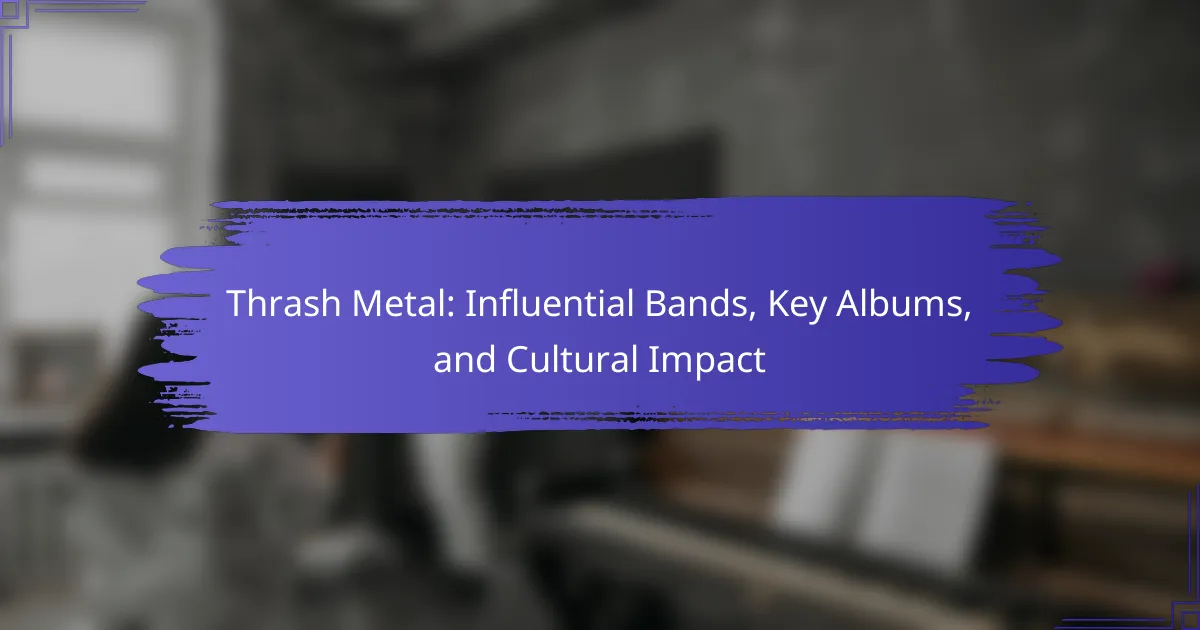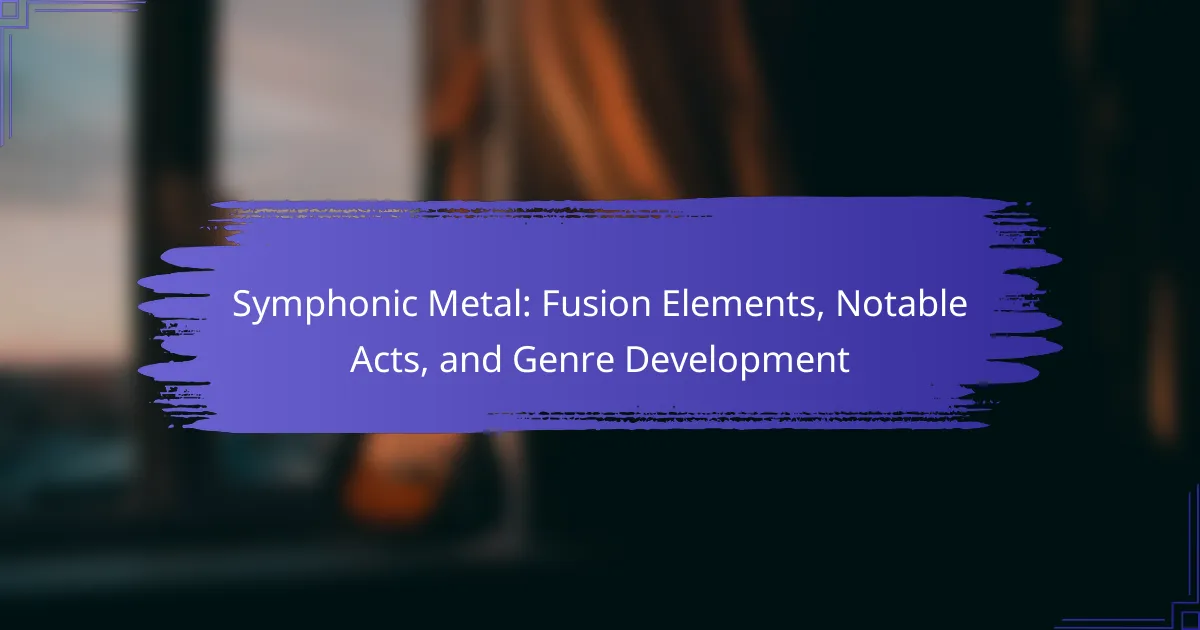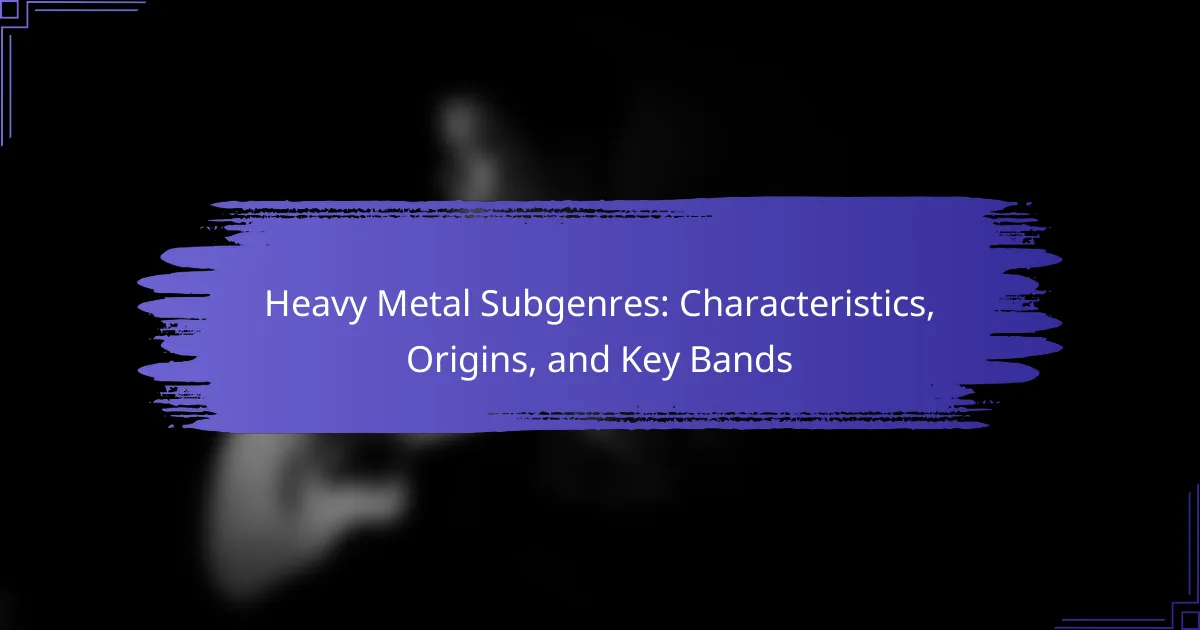Progressive Metal captivates listeners with its complex song structures and thematic depth. This genre features intricate instrumentation, time signature changes, and genre blending. Influential albums like “Images and Words” and “Operation: Mindcrime” highlight its artistic ambition. Noteworthy bands such as Dream Theater, Tool, and Opeth each contribute unique styles that shape the sound of Progressive Metal.

What are the defining characteristics of Progressive Metal?
Progressive Metal is defined by complex song structures, intricate instrumentation, and thematic depth. Key elements include time signature changes, extended compositions, and blending of genres such as jazz and classical. Influential albums like “Images and Words” by Dream Theater and “Operation: Mindcrime” by Queensrÿche showcase these traits. Noteworthy bands include Tool, Opeth, and Symphony X, each contributing unique attributes to the genre.
How does Progressive Metal differ from other metal genres?
Progressive Metal is characterized by complex structures, unconventional time signatures, and a fusion of various musical styles. Unlike other metal genres, it emphasizes musical experimentation and intricate compositions. Key elements include extended song lengths, thematic conceptualization, and virtuoso musicianship. Influential albums like “Images and Words” by Dream Theater showcase these traits, distinguishing Progressive Metal from traditional metal forms. Noteworthy bands such as Opeth and Tool further exemplify this genre’s unique approach to melody and rhythm.
What role do time signatures and tempo changes play in Progressive Metal?
Time signatures and tempo changes are fundamental in Progressive Metal, enhancing complexity and emotional depth. These elements create dynamic contrasts, enabling intricate rhythms and varied pacing. For example, shifting from a 7/8 time signature to a 4/4 can evoke tension and release, characteristic of the genre. Bands like Dream Theater and Tool exemplify this technique, using tempo changes to drive narrative and musical progression.
Which instruments are commonly used in Progressive Metal?
Progressive Metal commonly features electric guitars, keyboards, bass guitars, drums, and vocals. These instruments create intricate soundscapes and complex rhythms, essential to the genre’s identity. Electric guitars often utilize advanced techniques like tapping and sweep picking. Keyboards add atmospheric layers, enhancing the genre’s progressive nature. Bass guitars provide depth, while drums contribute to dynamic shifts and polyrhythms. Vocals can range from melodic singing to growls, reflecting emotional intensity.
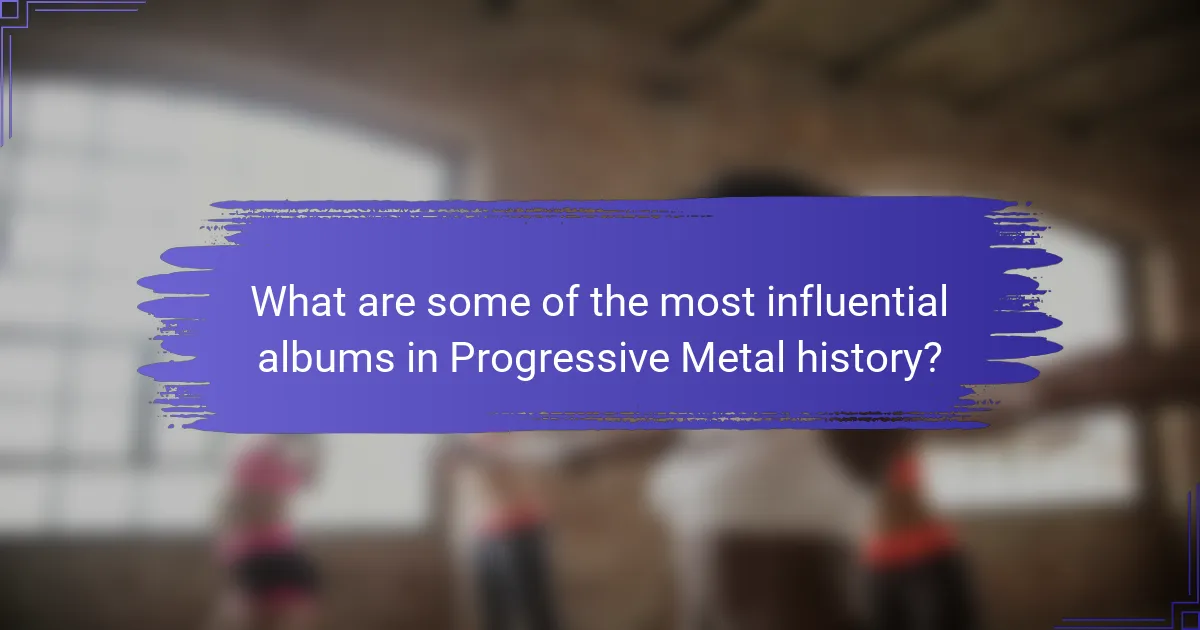
What are some of the most influential albums in Progressive Metal history?
Some of the most influential albums in Progressive Metal history include “Images and Words” by Dream Theater, “Operation: Mindcrime” by Queensrÿche, and “Lateralus” by Tool. These albums showcase the genre’s complexity, combining intricate musicianship with thought-provoking lyrics. “Images and Words” introduced a new standard for technical proficiency and songwriting in the 1990s. “Operation: Mindcrime” is celebrated for its conceptual depth and narrative structure. “Lateralus” is known for its exploration of themes like spirituality and human experience, featuring complex time signatures and polyrhythms. Each of these albums has significantly shaped the sound and direction of Progressive Metal.
Which albums are considered essential listening for fans of the genre?
Essential albums for progressive metal fans include “Images and Words” by Dream Theater, “Operation: Mindcrime” by Queensrÿche, “Metropolis Pt. 2: Scenes from a Memory” by Dream Theater, “Awake” by Dream Theater, “The Wall” by Pink Floyd, and “Lateralus” by Tool. These albums showcase the genre’s complexity and musicianship.
How have landmark albums shaped the evolution of Progressive Metal?
Landmark albums have significantly influenced the evolution of Progressive Metal by expanding its musical boundaries and introducing complex structures. Notable albums like “Images and Words” by Dream Theater and “Operation: Mindcrime” by Queensrÿche have set high standards for musicianship and lyrical depth. These works introduced intricate time signatures, thematic concepts, and virtuoso performances that shaped the genre’s identity. As a result, they inspired countless bands to explore innovative sounds and push creative limits, establishing a lasting legacy within the Progressive Metal community.
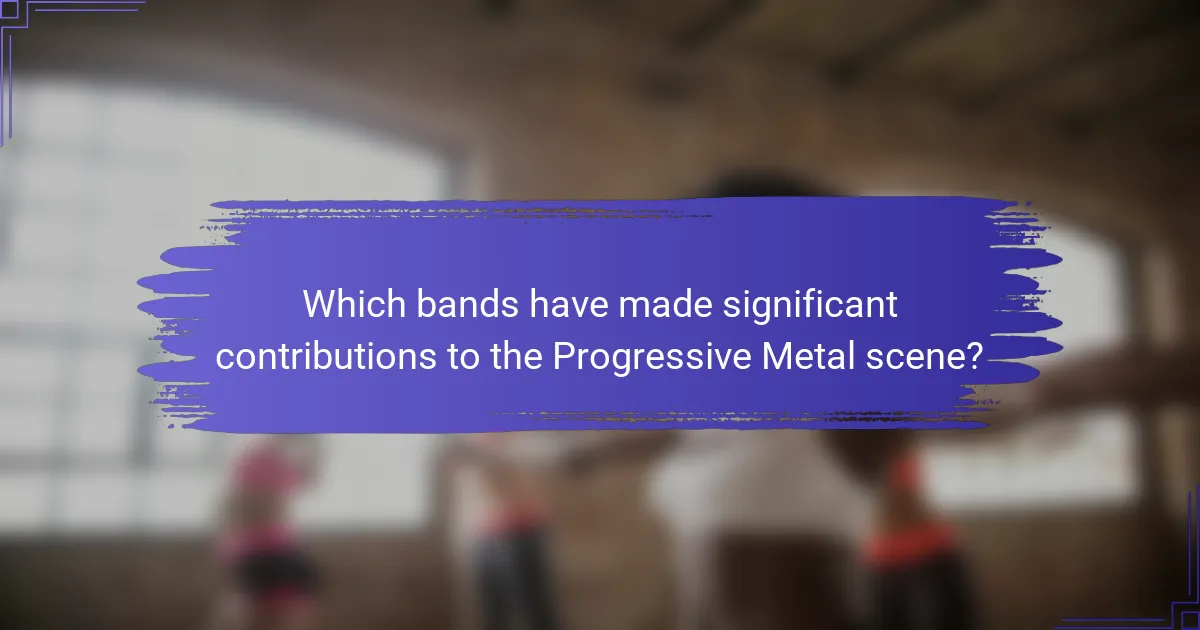
Which bands have made significant contributions to the Progressive Metal scene?
Dream Theater, Tool, and Opeth are among the most influential bands in the Progressive Metal scene. Dream Theater’s “Images and Words” set a benchmark for technical proficiency and songwriting. Tool’s “Lateralus” is known for its complex rhythms and philosophical lyrics. Opeth blends progressive elements with death metal, exemplified in “Blackwater Park.” Other notable bands include Symphony X, Fates Warning, and Porcupine Tree, each contributing unique styles and concepts that have shaped the genre.
What are the characteristics of iconic Progressive Metal bands?
Iconic Progressive Metal bands share complex compositions, diverse influences, and thematic depth. They often feature intricate guitar work, dynamic song structures, and a blend of genres. Bands like Dream Theater and Tool exemplify these characteristics through their innovative approaches and lyrical storytelling. Their albums frequently explore philosophical and existential themes, enhancing the listener’s experience.
How do regional bands influence the global Progressive Metal landscape?
Regional bands significantly shape the global Progressive Metal landscape by introducing diverse influences and innovative sounds. They often blend local musical traditions with the genre’s complex structures, enriching the overall style. For instance, bands from Scandinavia incorporate folk elements, while those from South America may integrate Latin rhythms. This fusion creates a unique auditory experience that resonates with a broader audience.
Additionally, regional bands often challenge mainstream norms, pushing the boundaries of Progressive Metal. Their experimentation leads to the emergence of sub-genres, such as djent and avant-garde metal, which further diversify the landscape. Noteworthy albums from these bands often receive international acclaim, influencing both established and emerging artists.
The rise of digital platforms allows regional bands to reach global audiences, fostering collaborations across borders. This interconnectedness enhances the genre’s evolution, making it more dynamic and inclusive. As a result, the global Progressive Metal scene continues to thrive, driven by the creativity and innovation of regional acts.
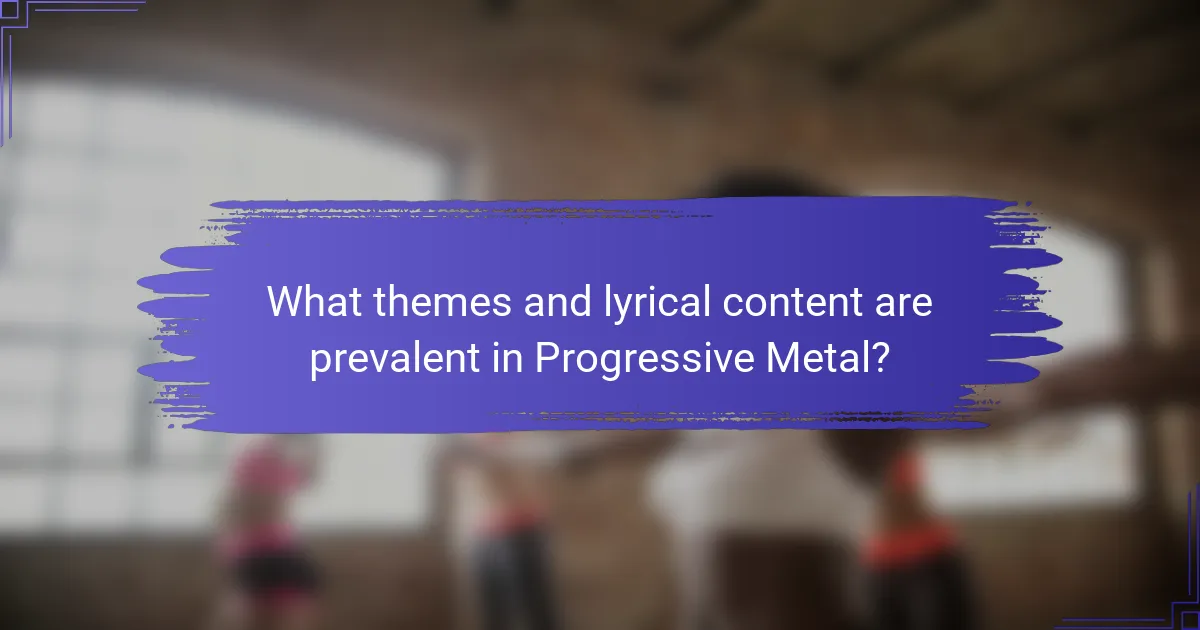
What themes and lyrical content are prevalent in Progressive Metal?
Progressive metal features themes of complexity, introspection, and philosophical exploration. Lyrical content often delves into personal struggles, existential questions, and intricate narratives. Notable attributes include the use of allegory and storytelling, which sets it apart from other genres. Influential albums like “Images and Words” by Dream Theater and “Lateralus” by Tool exemplify these themes, showcasing the genre’s depth and artistic ambition.
How do Progressive Metal lyrics reflect philosophical or conceptual ideas?
Progressive metal lyrics often explore philosophical and conceptual ideas, reflecting themes such as existentialism, consciousness, and the human condition. These lyrics frequently challenge listeners to contemplate deeper meanings and question reality. For instance, albums like “Metropolis Pt. 2: Scenes from a Memory” by Dream Theater delve into themes of reincarnation and memory, while Tool’s “Lateralus” emphasizes personal growth and the pursuit of knowledge. The complexity of the music complements the intricate lyrical content, creating a rich tapestry that encourages introspection and intellectual engagement.
Which common motifs are explored in Progressive Metal songs?
Progressive Metal songs often explore motifs such as existentialism, fantasy, and personal struggle. These themes reflect a deep emotional and intellectual engagement, making the genre distinct. Notable examples include the exploration of time and space in Dream Theater’s works, as well as the narrative-driven lyrics of bands like Symphony X. Additionally, social commentary and philosophical inquiries frequently appear, adding layers of meaning to the music.
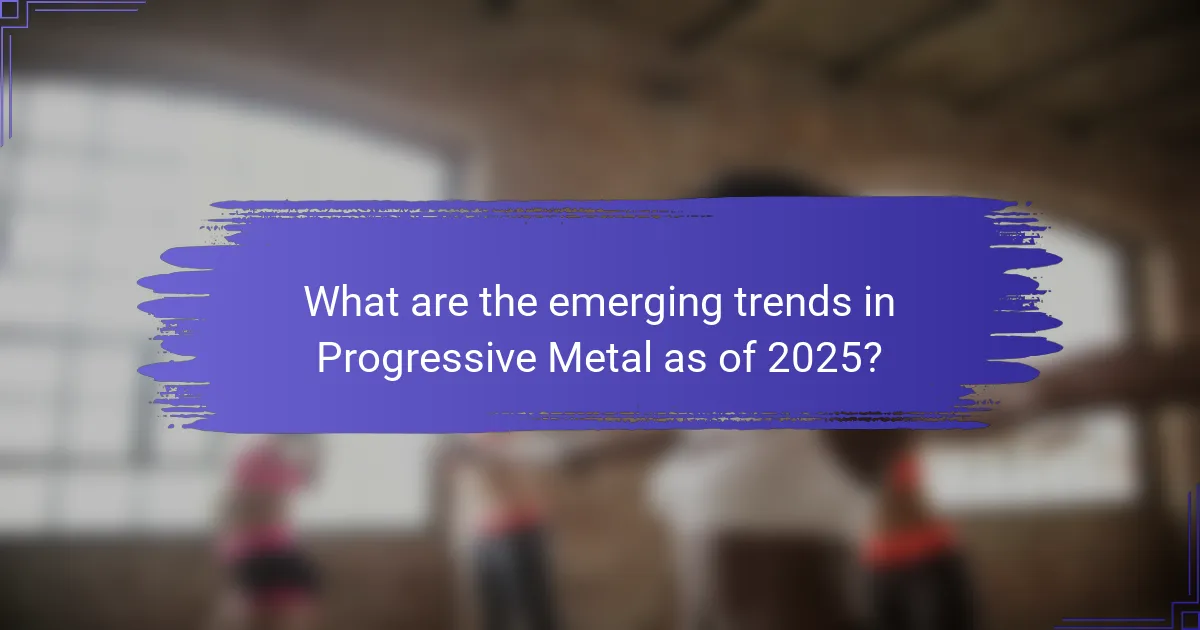
What are the emerging trends in Progressive Metal as of 2025?
Emerging trends in Progressive Metal as of 2025 include increased genre fusion, innovative technology in production, and a focus on conceptual storytelling. Bands are blending elements from other genres, such as electronic and jazz, to create unique soundscapes. The use of advanced production techniques enhances the listening experience, allowing for intricate sound layering. Additionally, lyricism is evolving, with many artists exploring deeper narratives and themes, reflecting societal issues and personal journeys.
How is technology influencing the production and distribution of Progressive Metal?
Technology significantly influences the production and distribution of Progressive Metal by enhancing sound quality and accessibility. Digital audio workstations enable intricate compositions and precise editing, allowing bands to experiment with complex arrangements. Streaming platforms facilitate global reach, enabling niche genres like Progressive Metal to connect with diverse audiences. Social media promotes band visibility, fostering fan engagement and community building. Innovations in music production, such as virtual instruments and software plugins, expand creative possibilities, making high-quality production more attainable for independent artists.
What new bands are gaining recognition in the Progressive Metal community?
Several new bands are gaining recognition in the Progressive Metal community, including Haken, Leprous, and Vola. These bands are known for their innovative sound and complex compositions. Haken’s album “Vector” showcases their unique blend of progressive and metal elements. Leprous has gained acclaim for their emotive vocals and intricate arrangements, particularly in “Pitfalls.” Vola offers a modern twist with electronic influences, evident in their album “Applause of a Distant Crowd.” Other notable mentions include Soen and The Ocean, both pushing boundaries within the genre.
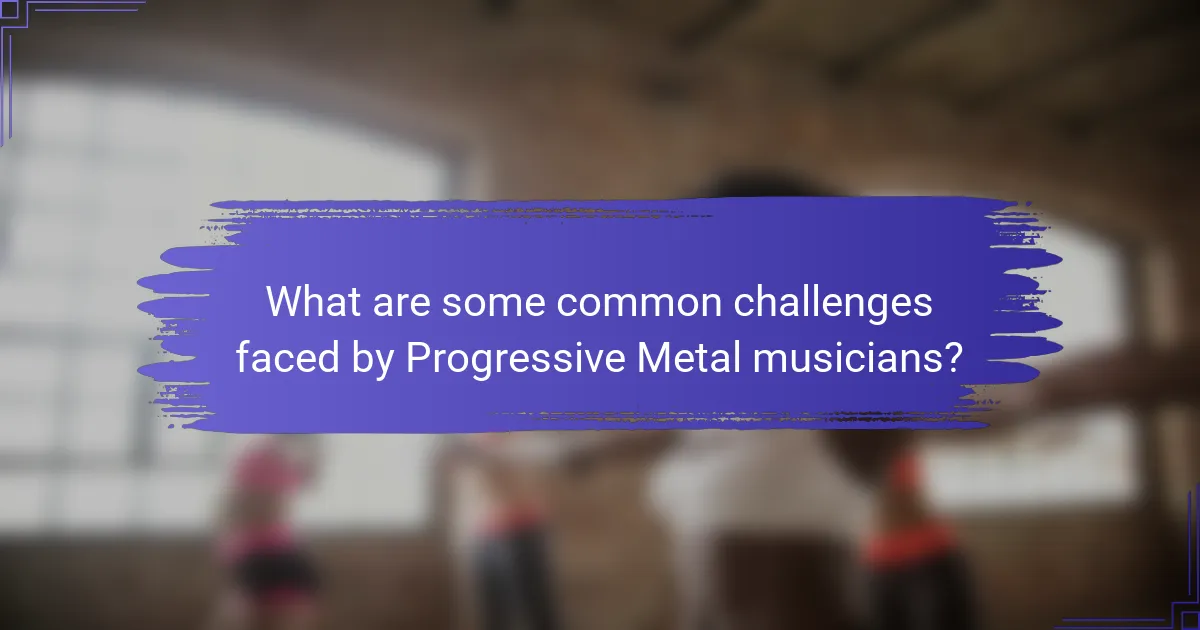
What are some common challenges faced by Progressive Metal musicians?
Progressive Metal musicians often face challenges such as complex compositions, genre blending, and audience expectations. These elements require technical proficiency and creativity, making it difficult to balance artistic expression with commercial viability. Additionally, the niche nature of the genre can limit opportunities for exposure and touring. The pressure to innovate while maintaining a distinct sound can also lead to creative fatigue.
How do artists navigate the balance between complexity and accessibility?
Artists balance complexity and accessibility in progressive metal by integrating intricate musical elements while ensuring emotional resonance. They often employ varied time signatures and unconventional song structures, which appeal to both technical musicians and casual listeners. Influential albums, like “Images and Words” by Dream Theater, showcase this balance, blending virtuosic instrumentation with relatable themes. Noteworthy bands, such as Opeth and Tool, further exemplify this approach by crafting layered compositions that invite deeper exploration without alienating their audience.
What are the difficulties in live performances for Progressive Metal bands?
Progressive Metal bands face several difficulties in live performances. Complex song structures often challenge musicians to maintain precision while delivering intricate melodies. Additionally, the genre’s reliance on technical instrumentation can lead to sound balance issues during shows. Audience engagement may be hindered by lengthy compositions, which can test listener patience. Lastly, the need for high-quality equipment and skilled sound engineers is critical, impacting overall performance quality.
What best practices can help new bands succeed in the Progressive Metal genre?
New bands can succeed in the Progressive Metal genre by focusing on originality, technical proficiency, and strong songwriting. Collaborating with experienced musicians can enhance skills and broaden exposure. Networking within the metal community fosters opportunities for gigs and promotions. Engaging with fans through social media builds a loyal following. Finally, studying influential albums helps understand genre evolution and innovation.
